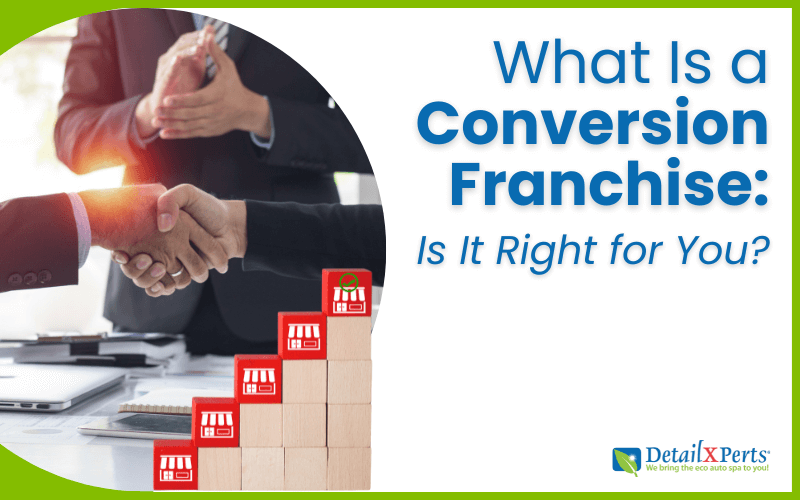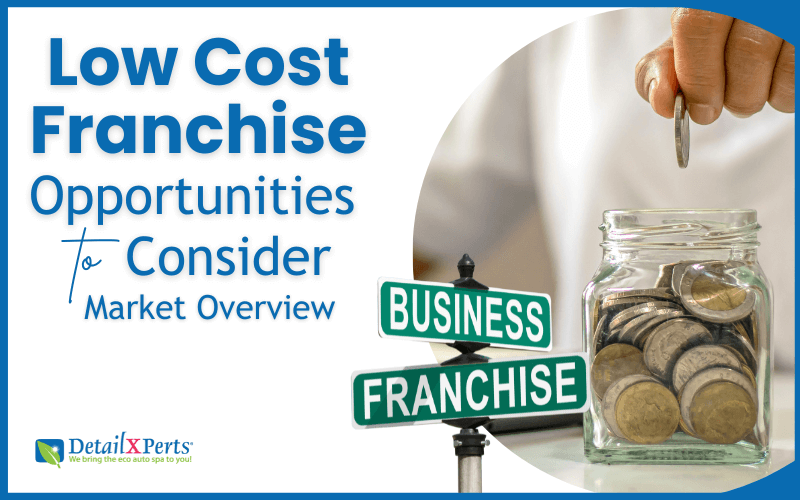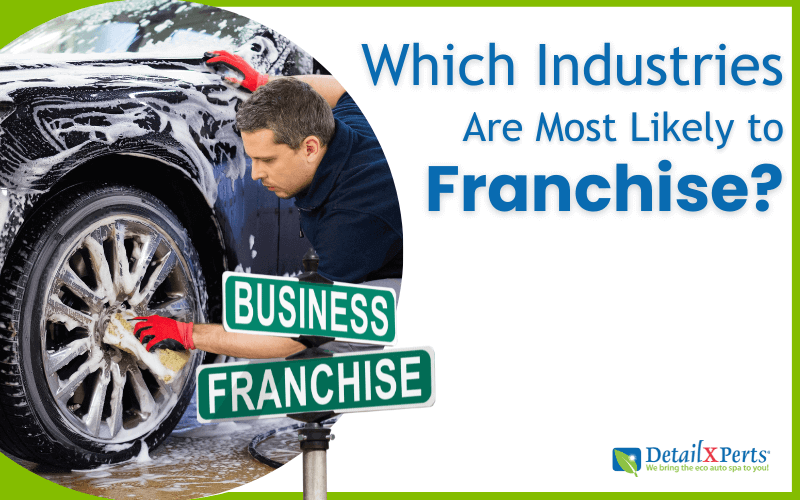If you already own a business and are looking for a smart way to scale, conversion franchising could be your next big move. However, it’s not something you jump into lightly. One of the first questions to ask is whether it’s the right fit for you because not every business is naturally suited for the franchise model. Therefore, it’s essential to understand the key steps involved, weigh the pros and cons of becoming a franchisee, and prepare for the changeover. Here’s what you need to know.
What is a Conversion Franchise?
Conversion franchising is when you convert your existing business into a franchise unit. Joining an existing brand means you can benefit from proven systems, marketing, training, and ongoing support from the franchisor. I.e., you’re building on the foundation they’ve already created to help you scale with confidence.
For example, if you already own a car wash or auto detailing business, you could convert to DetailXPerts’ system to leverage its successful brand reputation and eco-friendly steam cleaning innovation.
Types of Conversion Franchising
According to the International Franchise Association, there are generally two types:
- Industry-Aligned Conversion: This is when an independent business in the same industry as the franchise system (offering similar products or services) converts to operate under the franchisor’s brand.
- Diversification-Driven Conversion: In this case, you could convert to a franchise model to adapt to changing market conditions or overcome business challenges, even if it means shifting your company’s core focus.
Conversion franchising is a common sight across the country. Think of a mom-and-pop gas station or convenience store that rebrands as a 7-Eleven, or a local tax service joining the Liberty Tax franchise. Independent business owners often face the decision to rebrand under a franchise umbrella, and many do, for a range of strategic reasons.
Pros and Cons of Conversion Franchising
Conversion franchise meaning goes beyond simply turning your company into a franchise unit. You should also be aware of the pros and cons.
Advantages
Brand Recognition
Partnering with a franchise means your business benefits instantly from the trust and reputation of a national or international brand. And increased brand awareness makes it easier to attract new customers.
Proven Operating System
Franchisors offer streamlined operations, training, technology, and best practices. This allows you to focus more on growth and customer service. With a reputable business franchise format, you can skip the trial-and-error phase. The system has been developed and thoroughly tested over time, and its effectiveness has been proven.
Enjoy a Marketing Boost
A well-known franchise brand has marketing muscle and clout. Benefits of franchising include partnering with a brand that has trust and top-of-mind awareness among consumers, whether regional or national. This can lead to a noticeable boost in your online presence through enhanced SEO, professionally managed advertising campaigns, and greater exposure on social media and review platforms. To sum up, you’re not doing everything yourself; you’re tapping into a marketing engine that’s already running.
Access to Training and Support
Even if you’re a business owner, there is always something new to learn, especially if you want to stay ahead of the competition. That’s why going with a franchise can be a welcome move. You’ll learn how to be a franchise owner through onboarding programs, ongoing coaching, and peer networks for problem-solving and franchise growth strategies. Moreover, feeling part of a team can boost your motivation and sense of purpose.
Vendor Relationships and Buying Power
You can often negotiate better pricing for supplies, equipment, or services through collective purchasing.
Disadvantages
Franchise Fees and Royalties
You’ll have to pay an upfront franchise fee. Also, there may be ongoing royalty fees, which will reduce your profit margins. These fees vary widely across industries. Before investing, ensure that the profits you earn as a franchisee more than offset any fees. Otherwise, a conversion franchise won’t be in the best interest of your business. So, always do your profit calculations first.
New Brand Identity
How attached are you to your company name? A conversion franchise means you’ll need to rebrand your business, including signage, uniforms, vehicles, and sometimes the name. Therefore, this can feel like losing part of your identity.
Less Flexibility
One of the trade-offs of converting to a franchise is that you no longer make the rules; you follow them. For instance, you may need to adjust your pricing strategy, train staff, or structure your business to fit within the brand’s standards.
Selling Your Business
Your exit strategy can be more complex than selling your own business. To illustrate, selling or transferring a franchise unit usually involves restrictions, franchisor approval, and specific legal or contractual obligations. This can make the process more regulated and time-consuming.
When converting to a franchise, you typically agree to a fixed term, often five years or more, and may be bound by non-compete clauses that restrict your ability to operate a similar business after leaving the system.

Conversion Franchise Examples
If you need help growing your business and want to take advantage of franchise support and guidance, there are plenty of opportunities. For instance, switching to franchising is popular in auto detailing, cleaning services, home maintenance, fitness, and real estate.
- DetailXPerts: Are you looking to take your mobile cleaning business or car wash to the next level? This franchise offers a multi-profit model. Mobile detailing, fleet cleaning, and janitorial cleaning, all scalable and repeatable across locations. Leverage the brand’s success as an eco-friendly, water-saving steam cleaning business. You can discover new eco-aware clients and B2B operations like fleets and dealerships.
- Ace Hardware: If you own an independent hardware store, you could convert to an Ace Hardware franchise, adopting Ace’s brand, purchasing power, marketing support, and operational systems. This franchise is among Entrepreneur’s Franchise 500.
- The UPS Store: Independent shipping centers or print shops have joined The UPS Store network to increase customer trust and drive foot traffic with this highly-ranked brand.
- Anytime Fitness: Do you own a gym? Some locally owned gyms have converted to this franchise model to attract more members and benefit from corporate marketing efforts.
- RE/MAX: Many independent real estate brokerages have joined the RE/MAX network to gain access to its national brand recognition, technology tools, and training.
These examples show how conversion can apply across various sectors—especially service-based industries where reputation, operations, and customer relationships already exist.
How to Turn Your Company into a Franchise
Converting a business to a franchise is a bold move. However, it is totally doable, provided you understand how the franchise business model really works. Here are the necessary steps, using a car wash business as an example:
Find a Suitable Franchise
Gather all the franchise information you can. First, look for franchise brands that align with your current services, values, and target market. Then, shop around because not every brand will be a natural fit with your business. Remember, you’re looking for more than just a big brand name. You want franchise value. And this includes support, proven systems, and a brand that will help you grow. Key points to ask:
- Does this franchise align with the services I already offer?
- Do I believe in the brand’s purpose and goals?
- Will this be beneficial to the long-term value of my business?
Review the FDD (Franchise Disclosure Document)
This is where things get real. The franchise disclosure document lays out the details: startup costs, franchise fees, training programs, ongoing royalties, and your obligations as a franchisee. It’s a lot to take in, but you need to give it your full attention.
It’s wise to bring in a franchise lawyer to go over the paperwork and small print. Franchise contracts are legally binding, and terms in the franchise agreement (like territory restrictions, renewal clauses, or exit terms) can affect your long-term success. A good lawyer will spot red flags and help you with questions to ask a franchisor.
How Much Do You Need to Invest?
Most franchises charge an upfront franchise fee, plus additional costs for marketing, inventory, etc. And don’t forget you’ll need working capital. You have options when it franchise financing. For example, SBA loan for franchise, bank loans, or even tapping into retirement funds through a ROBS (Rollover for Business Startups) arrangement. A strong franchisor will often help guide you through financing options.
Rebranding
Time for a change. You’ll take on the look and feel of your new franchise brand. This may involve updating signage, websites, uniforms, and business cards to meet franchise standards. It’s a big shift, but a supportive franchisor will give you all the tools and templates you need to make it as stress-free as possible.
Complete Training and Onboarding
You’ll learn all about how your franchise does business. Most franchise systems will offer a training program, usually in-person and online, to get you up to speed. Done right, it will set you up for success. The essential know-how includes:
- How to run the day-to-day operations using their systems.
- Tips for great customer service and managing your team.
- Proven strategies for sales and marketing.
- The rules and standards you’ll need to follow to stay on brand, including how to avoid franchise mistakes.
Launch Under the New Brand
It’s time to show off your new brand identity and get to work. Let your customers and the local community know about your exciting news. Make good use of the franchise support and proven model to scale faster than you could on your own.
More Opportunities for You
If you’re ambitious, you could explore a master franchise opportunity. This model lets you oversee a territory, recruit new franchisees, and share in the growth of the brand in your region. It’s more responsibility, but also potentially lucrative.
Is Conversion Franchising Right for You?
A conversion franchise may be a good fit if:
- You run a successful, operationally sound business.
- You want to grow faster with proven systems and support.
- You’re comfortable aligning with a franchisor’s brand and franchise laws.
- You’re seeking more predictability and scalability.
It might not be a good fit if:
- You strongly value independent branding and creative control.
- You’re not ready to invest in training, fees, or operational changes.
- Your business model doesn’t align with available franchise systems in your niche.
Conclusion
To sum up, conversion franchising is an opportunity to grow your business with the support of a trusted and established franchise system. You can enjoy multiple benefits, including a fresh start, stability, instant brand recognition, operational support, and marketing help. However, it’s not for everyone. The opportunity must be the right fit for your business and your goals. So, do your research and carefully study the legal and financial side of things.
If you’re in the cleaning business or auto detailing and want to scale sustainably, DetailXPerts can help you get there. Our mobile steam cleaning franchise has proven systems and multiple profit centers, perfect if you’re looking to grow a green business with purpose.
If you’re interested in buying an eco-friendly franchise, download our business model overview, where we’ll introduce you to our gentle hand wash using steam cleaning technology.










